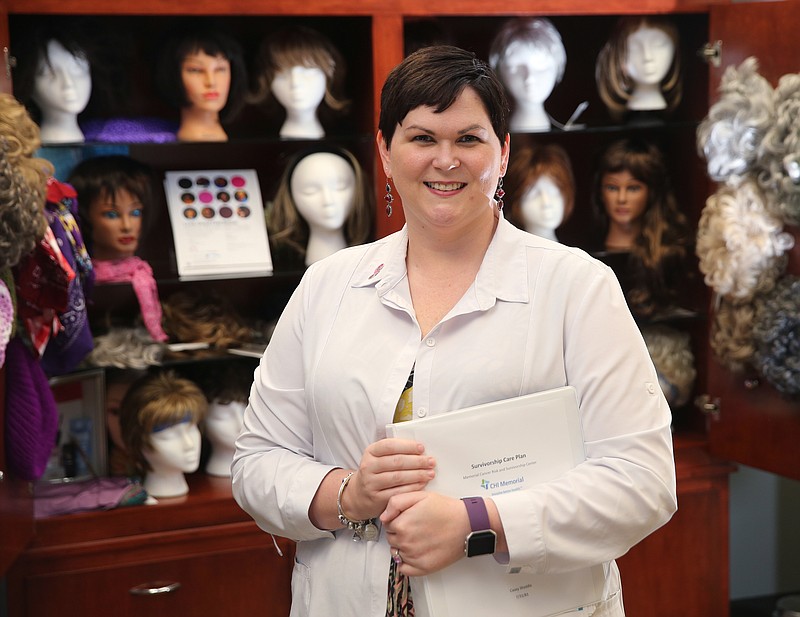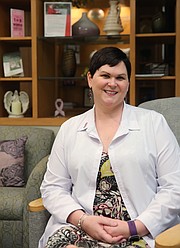For Casey Waddle, attitude is what matters most in fighting cancer.
When she was diagnosed with breast cancer nearly three years ago, it was her sense of humor that kept her going through the days of chemotherapy and then surgery, she said.
"Attitude is everything, it can make or break you," Waddle said. "It's going to help you and your family in how you cope with things."
For Amanda Finch, it was her family who helped in her struggles to keep her spirits up.
"I kept a pretty positive disposition, but I was not cheery all the time," she said. About two weeks after her diagnosis, "I didn't want to come out of the bedroom," she said. But her husband, Larry, "picked me up, and said, 'You're not going to do this.' He walked me down the street and got me some fresh air. He didn't know he had it in him. But he was really there for me. We made it through the heavy chemo and the crazy side effects and stuff. He was very attentive, and he really listened."
For Latisha Boyd, what got her through her struggle with cancer was her religious faith. She was born with cerebral palsy and was not able even to crawl until she was 9, so confronting cancer was just another step in a lifelong struggle.
"God didn't ever say that life would be fair," she said in a recent interview. "I really depend on the Lord. I've seen him bring me through so much. After I was born, I couldn't walk, I couldn't talk, I couldn't even hold my head up. If he could bring me through that "
The first Sunday in June is National Cancer Survivors Day, a day to remind those diagnosed with cancer that many millions of people have gone before them, been cured of the disease and moved on to productive lives.
"We are seeing an upswing. There are 15.5 million cancer survivors in the U.S.," said Waddle, a nurse practitioner who works with cancer patients at CHI Memorial hospital. "It's estimated there will be 20.3 million by 2026."
As more people survive cancer, caregivers are realizing how important a patient's attitude can be in improving the odds of successful treatment, while also realizing that cancer survivors may have their own special needs even after being cured of the disease.
While the odds of surviving cancer have improved, there is a reason so many cancer patients describe that experience in military terms, as a struggle or war or battle.
"This is not something that just happens and you come into the hospital and you get over it and you move on," said Dr. Manoo Bhakta, chief of pediatric hematology oncology and one of the top cancer specialists at Children's Hospital at Erlanger. Treatments take months or even years, and the tedious rounds of chemotherapy and radiation can cause nasty side effects and drain patients of their energy, both physical and emotional. Surgery is scary, and a recovery may take weeks of physical therapy.
How patients cope with that challenge can be an important factor in their survival.
"I see two types of patients, patients who take charge of their health and say they are going to control cancer rather than letting cancer and cancer treatment control them," said Janet Kramer-Mai, a nurse who is director of cancer support services at the Erlanger Cancer Center. "And then there is the polar opposite, they're going to go home and lie on the couch, and let the diagnosis and treatment control them."
"I see some people with a poor attitude who have a lot of doctors' appointments who get overwhelmed easily, and they only want to do one a day, only three this week, so they skip the rest," said Stephanie Alfaro, a social worker who works with Kramer-Mai in the cancer center. "People with a more positive attitude say, 'This is what I'm going to do, I have my support team with me, and even if I don't feel up to it, I'm going to go do it.'"
Cancer treatment centers now understand that curing cancer is more than a physical or medical struggle.
"You can treat the disease, but you have to treat the disease and take care of the patient," said Kramer-Mai, who herself was cured of cancer 14 years ago.
That may include treating the family as well as the patient, particularly if that patient is a child.
"Parents, when they hear [a cancer diagnosis], are devastated," said Bhakta. "You can understand the feeling of helplessness and total loss that they feel. It's important to give them also the strength and hope to endure this. They have to change their whole life while their child is going through this journey of treatments, and the consequences of this stress on families is huge."
If both parents are working, one of them may need to quit in order to care for the child, increasing the financial pressure on the family. Other children may feel neglected by all of the attention being given to the child with cancer.
"It's not just the emotion and the pain of the child being sick - it affects your marriage, the other siblings, it affects you financially," Bhakta said.
By itself, a cancer diagnosis can be staggering. "The reaction can range from complete shock to devastation, obviously tears, anger and fear. All of those reactions are very normal," said CHI Memorial's Waddle. "If they are angry, we let them have that anger and time to process things. Let them know that it's understandable, that it is a scary diagnosis. You have to let them have that time to grieve and process it."
"I remember feeling like I was just out of time," Finch said. She had been overweight, at almost 300 pounds, she said, and had firmly resolved to do something about it, ordering some workout equipment.
"We had it delivered on Monday, I found my lump that week, and the next week I was diagnosed. I felt I was not only out of time for the healthy living I wanted to do. I felt out of time with my family. I remember missing everyone as if I hadn't seen them in years, just after that one phone call."
To help newly diagnosed patients cope, cancer specialists know that it is important for them to get a clear understanding of their specific cancer and what will be done to treat it early on, so they can focus on what they are facing.
"I have a love-hate relationship with the internet. If you don't know all of the specifics of your cancer, the internet can take you anywhere," said Katharine Toledano, chaplain in Erlanger's cancer center. "We encourage patients to know that their case is individual, and that they should listen to their physicians and their health care team."
"My doctors made sure I knew of everything, every side effect, they explained everything so well," said breast cancer survivor Davis. "If something happened, I was not scared because they had already prepared me for it."
Most hospitals now use support groups that include a mix of long-term cancer survivors as well as those who have recently been diagnosed. Survivors help new patients "to understand that there is a transition stage, that it takes a while before their anxiety goes down before a doctor's appointment or before blood work and scans are done," said Erlanger's Alfaro. "You're learning from those a little bit further ahead of you, so you get a better understanding of what your new normal is like. Those are the most reassuring words - that what you are feeling is normal, that your having a lack of sleep is normal and that you're going to get better, not in three months, but maybe in six months."
Once a patient has been cured and regular cancer treatments have ended, there may still be a need for medical assistance, particularly for younger patients.
Because their bodies are young and strong, children can take more intense treatments than adults and have a much higher cancer survival rate, Bhakta said. The cure rate for childhood cancer overall is now between 85 and 90 percent, he said, compared to 30-40 percent when he began work in the late 1970s.
But because their bodies can be subjected to more intense radiation and chemotherapy, children can also be more vulnerable to consequences as they grow older.
"What we have learned, especially in the past 10 years, is that the toxicity [from chemotherapy] doesn't end when we stop the treatment," Bhakta said. "We may have cured the cancer, but their health has changed, and they continue to be at risk. They would not have had many of these problems at a later age if they did not get treatment for cancer."
Childhood cancer specialists have now started long-term research projects to follow young cancer survivors as they age.
"Changing their lifestyle becomes more important, to do more preventive work early on," Bhakta said. "With a child with cancer, we need to talk about a lot of things for them to have a healthy life. We have to worry about their heart, kidneys, lungs, and bones. We want them to lead a full life, to be gainfully employed, to be productive, and not be chronically ill and unable to do the things normal people desire out of life."

